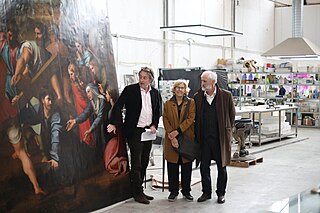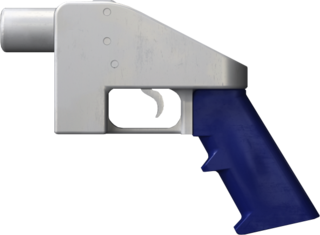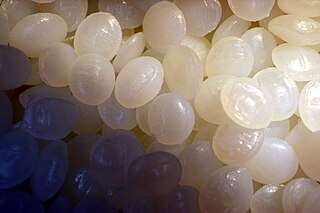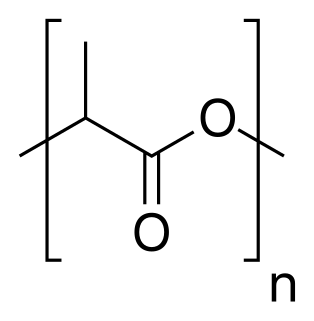 W
WFused filament fabrication (FFF), also known as fused deposition modeling, or called filament freeform fabrication, is a 3D printing process that uses a continuous filament of a thermoplastic material. Filament is fed from a large spool through a moving, heated printer extruder head, and is deposited on the growing work. The print head is moved under computer control to define the printed shape. Usually the head moves in two dimensions to deposit one horizontal plane, or layer, at a time; the work or the print head is then moved vertically by a small amount to begin a new layer. The speed of the extruder head may also be controlled to stop and start deposition and form an interrupted plane without stringing or dribbling between sections. "Fused filament fabrication" was coined by the members of the RepRap project to give a phrase that would be legally unconstrained in its use, under the mistaken belief that a trademark protected the term "fused deposition modeling".
 W
WA Bowden extruder is a type of filament feeding mechanism used in many FDM 3d printers that pushes filament though a long and flexible PTFE (Teflon) tube to the hot end. An alternative type of extruder which is also widely used in filament 3D printers is the direct drive extruder or direct extruder, which sits closer to the extruder hot end.
 W
W3D Systems, headquartered in Rock Hill, South Carolina, is a company that engineers, manufactures and sells 3D printers, 3D printing materials, 3D scanners, and offers a 3D printing service. Chuck Hull, the CTO and former president, pioneered stereolithography and obtained a patent for the technology in 1986. The company creates product concept models, precision and functional prototypes, master patterns for tooling, as well as production parts for direct digital manufacturing. It uses proprietary processes to fabricate physical objects using input from computer-aided design and manufacturing software, or 3D scanning and 3D sculpting devices.
 W
WThe 3DBenchy is a proprietary, copyrighted 3D computer model specifically designed for testing the accuracy and capabilities of 3D printers. The 3DBenchy is described by its creator, Creative Tools, as "the jolly 3D printing torture-test" and was released in April 2015, with a multi-part, multi-color model released in July 2015. The authors refuse to release the source code, and do not allow modifications. Due to its status as a common benchmark, it is believed to be the world's most 3D printed object. The model itself is a freelanced tugboat design, and actually floats in water given the right conditions in printing.
 W
WAcrylonitrile styrene acrylate (ASA), also called acrylic styrene acrylonitrile, is an amorphous thermoplastic developed as an alternative to acrylonitrile butadiene styrene (ABS), but with improved weather resistance, and is widely used in the automotive industry. It is an acrylate rubber-modified styrene acrylonitrile copolymer. It is used for general prototyping in 3D printing, where its UV resistance and mechanical properties make it an excellent material for use in fused deposition modelling printers.
 W
WAirwolf 3D is a Costa Mesa, California-based company that produces 3D printers.
 W
WAleph Objects, Inc. was a small manufacturing company based in Loveland, Colorado. Their business model focuses around the development of Open-source hardware for 3D printing with full support for Free and open-source software.
 W
WBorosilicate glass is a type of glass with silica and boron trioxide as the main glass-forming constituents. Borosilicate glasses are known for having very low coefficients of thermal expansion, making them more resistant to thermal shock than any other common glass. Such glass is subjected to less thermal stress and can withstand temperature differentials without fracturing of about 165 °C (297 °F). It is commonly used for the construction of reagent bottles and flasks as well as lighting, electronics and cookware.
 W
WThe DEFCAD Charon is an open source 3D-printable AR-15 lower receiver project that was partially inspired by the Fabrique Nationale P90. It began as a design exercise by a DEFCAD user to explore FDM additive manufacturing technology as a means of integrating the P90's ergonomics into a stock for the AR-15, resulting in the WarFairy P-15 stock set.
 W
WFactum Arte is an art conservation company based in Madrid, Milan, and London. Its commercial activity involves assisting contemporary artists to create technically difficult and innovative works of art. It also seeks to promote the use of non-contact 3D digitisation technologies to record museum collections and historic monuments, especially in areas where these are at risk. Since 2009, Factum Arte's non-profit cultural heritage projects have been carried out through the Factum Foundation for Digital Technology in Conservation.
 W
WFarmBot is an open source precision agriculture CNC farming project consisting of a Cartesian coordinate robot farming machine, software and documentation including a farming data repository. The project aims to "Create an open and accessible technology aiding everyone to grow food and to grow food for everyone." FarmBot is an open source project allowing hardware, software and documentation modifications and additions from users.
 W
WThe Liberator is a physible (3D-printable) single shot handgun, the first such printable firearm design made widely available online. The open source firm Defense Distributed designed the gun and released the plans on the Internet on May 6, 2013. The plans were downloaded over 100,000 times in the two days before the United States Department of State demanded that Defense Distributed retract the plans.
 W
WThe Lyman filament extruder is a device for making 3-D printer filament suitable for use in 3-D printers like the RepRap. It is named after its developer Hugh Lyman and was the winner of the Desktop Factory Competition.
 W
WMakerBot Industries, LLC is an American desktop 3D printer manufacturer company headquartered in New York City. It was founded in January 2009 by Bre Pettis, Adam Mayer, and Zach "Hoeken" Smith to build on the early progress of the RepRap Project. It was acquired by Stratasys in June 2013. As of April 2016, MakerBot has sold over 100,000 desktop 3D printers worldwide. Since 2009, the company has released 6 generations of 3D printers, with the latest being the Replicator+ and Replicator Mini+. It was the leader of the desktop market with an important presence in the media but its market share is in decline. MakerBot also founded and operates Thingiverse, the largest online 3D printing community and file repository.
 W
WMaterialise NV, headquartered in Leuven, Belgium, is a company in the 3D printing / additive manufacturing sector.
 W
WPolycaprolactone (PCL) is a biodegradable polyester with a low melting point of around 60 °C and a glass transition temperature of about −60 °C. The most common use of polycaprolactone is in the production of speciality polyurethanes. Polycaprolactones impart good resistance to water, oil, solvent and chlorine to the polyurethane produced.
 W
WPolylactic acid, also known as poly(lactic acid) or polylactide is a thermoplastic polyester with backbone formula (C3H4O2)n or [–C(CH3)HC(=O)O–]n, formally obtained by condensation of lactic acid C(CH3)(OH)HCOOH with loss of water. It can also be prepared by ring-opening polymerization of lactide [–C(CH3)HC(=O)O–]2, the cyclic dimer of the basic repeating unit.
 W
WProtolabs is a company that provides rapid manufacturing of low-volume 3D printed, CNC-machined, sheet metal, and injection-molded custom parts for prototyping and short-run production. Markets like medical devices, electronics, appliances, automotive and consumer products use these parts. Protolabs' headquarters and manufacturing facilities are located in Maple Plain, Minnesota. The company also has manufacturing facilities in England, Germany, and Japan.
 W
WStratasys, Ltd. is an American-Israeli manufacturer of 3D printers and 3D production systems for office-based rapid prototyping and direct digital manufacturing solutions. The company is incorporated in Israel. Engineers use Stratasys systems to model complex geometries in a wide range of thermoplastic materials, including: ABS, polyphenylsulfone (PPSF), polycarbonate (PC) and polyetherimide and Nylon 12.
 W
WUltimaker is a 3D printer-manufacturing company based in the Netherlands, with offices and assembly line in the US. They make fused filament fabrication 3D printers, develop 3D printing software, and sell branded 3D printing materials. Their product line includes the Ultimaker S5 and S3, Ultimaker 3 series, Ultimaker 2+ series and Ultimaker Original+. These products are used by industries such as automotive, architecture, healthcare, education, and small scale manufacturing.